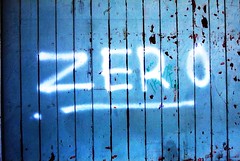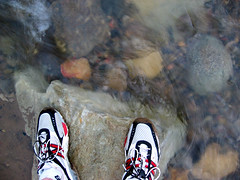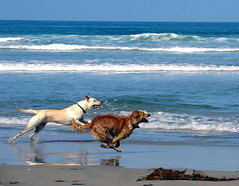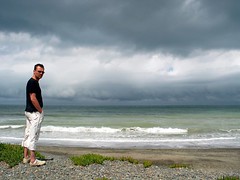Zero
 Photograph by ptr.
Photograph by ptr. Zero. The number of nothing. The Hindus and Buddhists gave us nothing, the Muslims expanded on it and spread it throughout the civilized world. The Christians were horrified by it. Nothingness. The void. Zero.
I watched the kid tag the door. Skinny kid. Poor, black. I mean
black. African black. So black he was almost purple. Took him about four seconds.
Zero has no value. Numbers were invented when it became important to count. One goat, two goats, three goats, many goats. In order to count, something had to be there. Counting begins with 'one.' The concept of no goats is an abstract concept, meaningless in its obviousness.
The kid was very matter-of-fact about tagging the door. He wasn't furtive or hurried. He just walked up to the door and began painting. It wasn't vandalism; it was an announcement. I'm here. I exist. This proves it. Count me.
Zero has two uses. First, in our numerical system it's an empty space indicator. It distinguishes 1066 from 166. Second, it's a numeral that denotes the existence of nothing. Zero is a dangerous, radical concept. It destabilizes. If you add or subtract zero from another number, nothing changes. If you multiply a number by zero, you destroy it. When you try to divide a number by zero, the whole system of mathematics breaks down.
I must have made a sound, because after the kid finished tagging the door he turned and looked at me. Not a challenging look. Not an angry look. Not a look of fear or uncertainty. A look of disinterest. A look that indicated I was irrelevant to his existence. No...that's wrong. A look that indicated his existence had no commonality with my existence.
Zero derives from the Arabic term
sifr, which also gives us 'cipher.' Cipher...to solve by means of arithmetic. Cipher...a coded message. Cipher...a nonentity.
"Why Zero?" I asked the kid. "It's what I call myself," he said. "Yes, but why
Zero?" The kid shrugged. "I wanted to be Zorro, but somebody already has that."
But the kid is Zero and he's all that zero means. He's an abstract concept whose existence tilts the world on its head. He's an indispensable indicator of an empty space. He's a nonentity with the capacity to disrupt the system. He's a coded message spray painted on the street.
The map of his life
In the left front pocket of his trousers he keeps his folding money. It's not much; just the few marks left over from his government pension after he pays the rent. In this pocket he also has some old prayer beads, carried out of habit.
In the interior pocket of his coat is his wallet, a thin slab of old leather, worn shiny and smooth, molded to his body shape. In the wallet is an out-of-date driver's license, a current library membership, a faded photograph of he and his wife on holiday in Rome, an old ticket stub from the 1984 Winter Olympics, and identity papers establishing him as Rijad Cengic, a widower, a citizen of Bosnia, living in apartment 4 at Kundudziluk 32 in Sarajevo.
In the right front pocket of his trousers are a few coins and a ring with three keys. The first key is to the front door of his building. The second key is to his mailbox in the foyer. The final key is to his apartment.
In his apartment, on the kitchen counter, is a dish drainer holding a single plate, a single glass, and a single knife, fork and spoon. On the two-burner stove is the cast iron skillet in which he fries his morning egg and toast and the teapot in which he boils the water for his six daily cups of coffee.
In the hallway of his apartment is a bicycle, an old French Motobecane, which he no longer rides. It's too much work to carry it up and down the stairs. Besides, he's never in a hurry these days; he has time to walk. On the wall above the bicycle is a hat and coat rack. On one peg of the rack hangs a dusty cap that had belonged to his son, who had gone down by the river to the Marlboro factory on a summer evening in 1993 to buy cigarettes and had never returned.
In the bedroom of his apartment is a bed whose mattress is indented on the right side...
his side...of the bed. Covering the bed, spread smooth as she'd have wanted, is the quilt his wife had finished in July of 1995, three years into the seige and just a few weeks before she went shopping at the Markale market where a mortar round killed 68 people and left her splayed open on the street like a butchered lamb.
On the dresser in his bedroom is a portrait of his family, turned yellow by the sun from the window. He and his wife standing behind his son and daughter, all of them smiling. In a drawer of the dresser is a small bundle of letters and postcards from his daughter, who now lives in a house in Astoria in the borough of Queens in New York City.
In the slump of his shoulders is the weight of his years. On his face is the map of his life.
More Pirates
I probably wouldn't have asked Gwen out if I'd known she had a kid. We'd already decided on the movie and where to have dinner when she said she'd need to check to see if her mother could watch her daughter. I'm thinking,
daughter? But it was too late to back out.
So I made a plan. See the movie, choke down a quick dinner, dodge any conversation involving the kid, take her home, drop her off, and then spend the next couple of months trying to avoid her in the hallways. I even picked a movie I figured she wouldn't like, some action flick about spies.
Over dinner Gwen said she enjoyed the movie, but would have liked it better if it'd had pirates. "Pirates make every movie better," she said. That's when I realized she was funnier than me. As we ate I learned she was also better read, quicker-witted, and maybe even smarter. I also got the impression she had even fewer expectations than I did...as if she knew there wasn't going to be a second date so she didn't have to try to impress me. Or even amuse me. In fact, I sensed she was just amusing herself and wasn't particularly concerned if I got all her jokes.
I followed the plan. Dropped her off and spent the next few days avoiding her in the hallways. But I kept thinking of things she'd said over dinner. The next weekend I took a date to see some old Ingmar Bergman film. Afterwards, over drinks, she talked about the symbolism and the brilliant cinematography. "Needed more pirates," I told her. She thought I was witty.
So I deliberately bumped into Gwen in the hallway and asked her out again. She hesitated, but agreed. Eventually I met the kid, who was also funnier than me and maybe smarter...but not as well read. After a year Gwen and I married. Her daughter was the ringbearer. Afterwards, I asked the kid what she thought about the wedding.
"Not enough pirates," she said.
A Scalpel of Bright Colors
I'm getting close to that point again. The point where I'll stop functioning and they'll put me back into the hospital. There's still so much to do so much to do I need to hold on just another week another couple of weeks. Then it'll be okay. By then I'll need the rest.
A chemical imbalance of some sort, is what they tell me. Something to do with my brain getting too much of some chemical, or maybe not enough. I don't pay attention; it doesn't matter. If I take the medication, the whole world becomes bland and colorless and lifeless and dull and I hate it hate it. When I stop taking the meds, the color returns. I see movement. I begin to see with a clarity so sharp it slices through everything like a Ginzu knife. Ginzu clarity. And it just gets sharper and sharper and then the sharpness gets cold so cold that it hurts to see.
That's when it's best, just when it begins to hurt. Just when it begins to hurt and the whole entire world becomes a scalpel of bright colors and you want be part of it all part of everything every little sharp thing, so sharp it's like a needle through the tongue and there's a copper taste to it, copper taste of blood. It's so beautiful so very very beautiful and pulsing and alive and beautiful.
Then it becomes too much. Too much and it's so bright and cold and sharp you can't sleep anymore, you can't remember to eat or bathe and the touch of water on your skin is like a million mosquito bites, mosquitoes with acid in their saliva. Horrible and beautiful and exquisite and horrible beautifulhorrible.
I have to make notes now, notes to eat and to bathe. But it's so easy to get lost in the sound of the pen on the notepad, the scratchy sound scratchy like the yellow fingernails of dead men on dried leaves, and it's hard to get the 'a' just right there are so many curves in it.
Red Shoes, Blue Sky
They were arrogant shoes. Shoes as haughty and imperious as a flamenco dancer. Swaggering, insolent shoes.
She wished she could wear shoes like that. She wished she could walk down the street, bold and impudent as a swashbuckler, in shoes that proclaimed themselves with every step. Shoes that declared 'Lesser mortals dare not wear me; I am only for the audacious.' She yearned for those shoes and the temerity to wear them.
She'd always been a sensible-shoe girl. A brown shoe girl, a girl whose shoe rack remained within the parameters of practicality and prudence. If she were transported to Oz by some freak meteorological event, then perhaps she could wear such shoes.
She looked away from the red shoes, looked up at the sky for any sign of a tornado, up at the disappointing empty pale blue sky.
Liquid Linguistics
Every few months I shift the stones around in the brook behind my house. You shift the stones and you shift the sound made by the water as it rushes by. Each stone has a unique shape; when you turn it or move it, a new sound is created. The stones are the brook's tongue. Shifting them is like teaching the brook a new language.
Sometimes I like to make the brook-washed stones speak softly, and in the calm, blue-tinted evening I'll sit by the shore and listen to the water expound on its pilgrimage all the long way to the ocean. Sometimes I'll pile the stones so the water roils violently and trumpets its strength, reminding me it will be here long after I'm gone and that even the stones will eventually succumb to it. Sometimes I'll arrange the stones so the water slides by in a musical murmur, a gentle and friendly nanny's burble that lulls me to nap in the hammock.
I tell myself the water likes it when I shift the stones. I tell myself the water takes pleasure in the change, that it enjoys wrapping itself around the stones in new ways.
Only the crayfish object.
Muscle Memory
I'm not a pretty woman, I know that. I never was and never will be. But I used to be a terrific athlete. That's better than being pretty.
Until I blew out my knee, I was one of the highest scoring midfielders in womens college soccer. I was asked to try out for the 2000 Olympic team, and I was being scouted for a professional team. But three weeks before the Olympic trials, I was on the escalator at the mall and an old woman two steps above me had a seizure. She fell back onto me, and I tumbled backwards down the steps. Tore my medial collateral ligament like it was a losing ticket at Churchill Downs.
I never got to qualify for the Olympics, and I lost my chance at a pro soccer career. But what I miss the most is the pure physical joy of the game. I miss racing flat out down the field, dribbling the ball. I miss leaping into the air for a header. I miss the the feel of kicking the ball, making it bend. I even miss the contact, crashing into another player, knocking her down or getting knocked down myself. I probably shouldn't admit it, but it's
fun to slam into people. I miss that. I miss how
fast I was. How graceful.
That was nearly seven years ago. Now I'm just a homely, sedate public relations manager for a company that sells medical technology. I have a condo near the beach, and every couple of weeks I walk down there and watch the dogs play. People think I'm a dog lover. I suppose I am, in a way.
But it's not dogs that I love; I wouldn't want a dog around the house. What I love is the way dogs play. They remind me of when I was a healthy young animal. They run flat out, totally unconcerned about conserving their energy. They juke and spin wildly, totally unencumbered by the thought process. They leap and turn for the pure physical delight of it. They don't care how they look. They don't care if they get dirty. They don't care if they appear awkward or ungainly...and because of that, they rarely are.
I remember being like that. My
body remembers it. I may not be pretty and I may no longer be an athlete. But there were times on the soccer pitch when I was as beautiful as anything you'd ever want to see. And when I hear one of the men in my office whisper to a buddy that I'm a dog, I think to myself "I wish."
Hear My Prayer
Okay God, she's dead now. It took you over a year to get the job done, but she's finally dead now. Finally released from the constant pain, released from the humiliation of having somebody else bathe her, from being 57 years old and having to wear a fucking diaper.
I hope you're happy now. I don't what we did to piss you off like this. We went to church...maybe not every week, but regularly. We were generous. We were good parents, good citizens. We voted. We did everything we were supposed to do.
You gave her cancer...okay. Somebody has to get cancer, I understand that. I'm not complaining. You let the company I work for go bust...okay. That happens. You let the top executives walk away with millions while the rest of us got unemployment...okay, I don't expect fairness. But I lose my pension, I lose my health insurance, I have to go into debt to pay the medical bills, I have to re-mortgage the house and spend all our savings. I even had to sell our cemetary plots and bury my wife...my
wife, damn it, who never whined or complained once, who just wanted to die, just wanted to get it over with, my wife who had faith in your goodness...I had to bury my wife in this fucking filing cabinet instead of the plot on the hill. You had no reason to do this to her.
She's dead now, you cocksucker, and I know it's a sin but I am so angry. Father Lehman says you work in mysterious ways. He says we cannot understand your plan. He says it's enough to know in our hearts that you have a plan and that we should have faith in you.
Well fuck him and fuck You. If this is your idea of a plan, you don't deserve the job. Maybe tomorrow I'll feel differently and pray for your forgiveness. But all I want right now is to get to heaven long enough to punch you in the fucking nose.
Amen. Amen amen amen.
What're ya gonna do?
Best goddamned fries on the East Coast, and that's no joke. It's about the cut of the potato, the heat of the oil, the freshness of the oil, and the spices. We make a damned good patty melt here at Jimmy Tom's too, and we don't put no grapes or raisins or other hippy shit in our chicken salad. But it's the fries gave us our reputation.
I been here at Jimmy Tom's since right after the war. Korean War. Didn't mean to be here this long. I was gonna be famous, ya know? I had a plan. Comedy writer, screenwriter, move to Hollywood and marry a blonde with big tits. I just needed one break, one chance to show what I got...and 'til then I figured I'd work here at the diner. Try out lines on the customers, ya know? See if they work. Soak up the atmosphere, all that.
Never got the break. Came close a couple times, but never really got it. Everything's changed now. Comedy's different, movies are different. My stuff, it's outa date. I know that, I know that. What're ya gonna do? So I'm still here.
Jimmy Tom, he died couple years back. His son owns the joint now. He's talking to people, thinking about making some changes. Maybe make it an internet cafe, maybe going retro. That's what he says, 'going retro.' I told him this place ain't changed since the goddamned Korean War, you want to make it retro you'd have to put up Civil War draft posters.
He's even thinking about changing the menu. Getting rid of the patty melts and the chicken salad and the fries, serving 'pan-asian cuisine,' whatever the fuck that is. I hate to see it, I really do, but what're ya gonna do? What're ya gonna do? Best goddamned fries on the East Coast, I shit you not, but hey...they're just french fries. Things change, and there it is.
Why This Beach
"Why
this beach?" my wife often asks.
There are beaches that are closer to the house. Beaches that are easier to reach. Beaches where you don't have to drive 90 minutes north, then park the car and hike half a mile. My wife smiles tolerantly and affectionately when I insist on coming here.
Why this beach? "I like that it's remote," I tell her. "I like that there aren't many people here. I like the solitude. I like the tidal pools here." And it's the truth; I do like those things. It's the truth...but not the whole truth.
How can I tell her the whole truth? Seven years ago, just after we were married, I had to travel to France on business. To Bordeaux, for a week-long project that turned into nearly three weeks. On the first weekend, everybody took the train to Paris. Everybody except me. I rented a car and drove south by myself, down the A63 to Aire sur l'Adour.
Why? Because Aire sur l'Adour is on the same latitude as Kittery, Maine, where my new wife sat waiting for me to return. It was silly and romantic, and I looked forward to telling her about it when I returned. I wanted to tell her that I stood on the beach and looked west, and the only thing that separated us was a few thousand inconsequential miles of water.
But it was raining when I got there and instead I sat in a little patisserie. There I met a woman. Isabeau. A nurse who was about to spend three months in Angola serving with Doctors Without Borders. Three months in a therapeutic feeding center in town called Malange. Three months in a country that had been in a civil war for thirty years, the heaviest mined country in the world, a country with more landmines than people.
I love my wife. I loved her then and I love her now. But I spent that weekend and the next with Isabeau. I did not tell my wife that I'd driven south to Aire sur l'Adour just to share the same latitude with her.
And now, seven years later, I find myself driving to a small beach located at 43 degrees north. I look east, and when nobody is near me I whisper to myself that the only thing separating me from Isabeau is seven years and a few thousand inconsequential miles of water.













